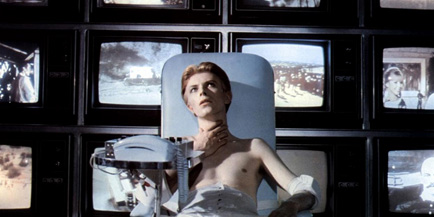|
|
Viking Night: The Man Who Fell to EarthBy Bruce HallOctober 13, 2015
It’s perplexing right from the start, as an alien spacecraft crash lands in the American Southwest, and its lone occupant wanders into a thrift store to sell his only possession, a gold ring. He identifies himself as Thomas Jerome Newton (Bowie), a British citizen with a New Wave haircut 10 years ahead of its time. He eagerly accepts 20 dollars for the ring, but minutes later, sitting by the side of the road somehow produces a roll of hundreds from his pocket. Did he rob the place? Did he spend the day at an Indian casino? Your guess is as good as mine, because this is only the first of many peculiar inconsistencies that never get explained. What we do know is that Newton has a thing for water, to the point that he’s willing to drink it right out of the kind of nasty looking creek you and I wouldn’t even stop to pee in. What's the deal with that, you say? Hold on. We'll get to that. Eventually Newton makes his way to Manhattan, which is probably not very hard when you can apparently fart hundred dollar bills. He randomly drops by the apartment of prominent patent lawyer Oliver Farnsworth (Buck Henry) with a portfolio full of world-changing technology and offers Farnsworth a cut if he'd be willing to go into business with a complete stranger. After looking past the initial shock of David Bowie standing in his living room with the blueprints for the Flux Capacitor, Farnsworth is able to see the dollar signs and agrees to the deal. If you're unclear as to the significance of this, imagine it's 1977 and Steve Jobs falls out of the tree in your front yard with an iPad under his arm and says "Do you think this might be important?"
|

|
|
|

|
Friday, November 1, 2024
© 2024 Box Office Prophets, a division of One Of Us, Inc.


